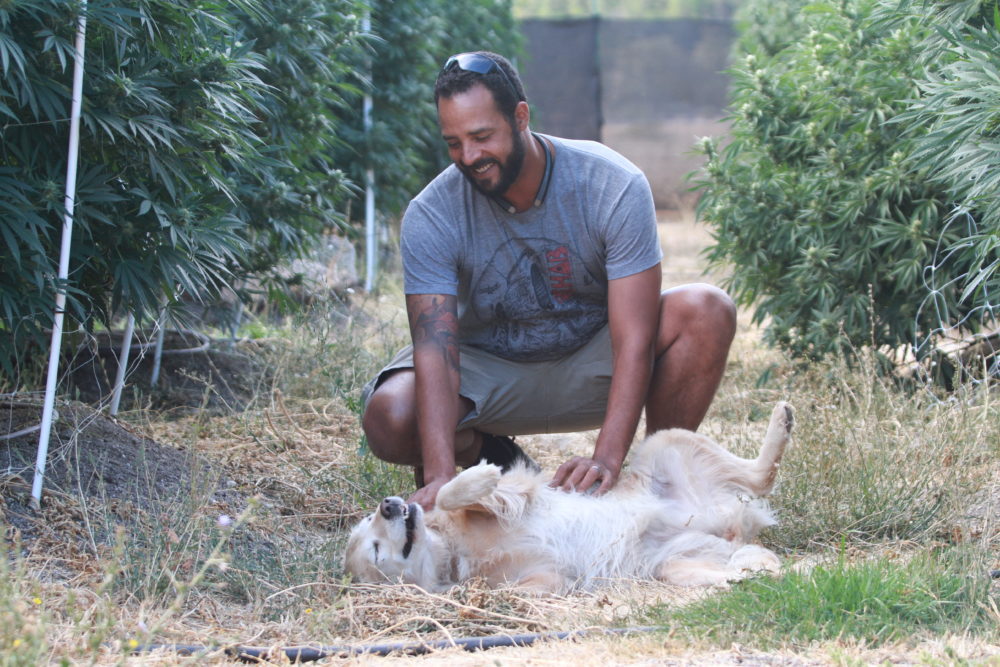
Grizz relaxes in the sun at Lady Buds Garden Club in Chelan, Washington.
Americans spend more than $60 billion annually on their pets. As cannabis becomes more widely accepted as medicine, it’s natural that some people have begun to consider the market for cannabis-based medicines for pets.
A wide variety of products targeted toward pets have already been introduced, from treats containing CBD to whole-plant tinctures. Due to the huge pet care industry and potential for increasing revenue, dispensary owners might be tempted to stock these products. However, the potential legal implications, coupled with a lack of understanding of pets’ needs, make this a risky investment.
For thousands of years, cannabis has been used to treat illness in humans and animals. In Ancient Greece, a poultice made from cannabis was used to treat a variety of ailments in horses. As recently as 1920, a tincture made from cannabis was used to alleviate the pain associated with colic in horses. This treatment was administered with the full support of the American Veterinary Association. However, when marijuana was officially outlawed, these treatments lost support from the AVA.

Yusef Guient gives Ulu a belly rub at an Oregon cannabis farm. Photo by Rachel Cavanaugh.
Currently, anecdotal evidence about the medicinal value of cannabis for pets is widely available, and cannabis has been used to treat many of the same ailments in pets as in humans, such as epilepsy, cancer and chronic pain. Yet, research is not being conducted on cannabis for animals and no states currently allow veterinarians to prescribe or recommend cannabis. Therefore, cannabis products for pets do not have the same legal protections afforded to products intended for human use.
The American Veterinary Medical Association does not recommend the use of medicinal cannabis for pets for a variety of reasons, including the lack of clinical research regarding its safety and efficacy. Because of this, most veterinarians are unfamiliar with using medical cannabis for patients and are unable to provide information about dosing and formulations. This means pet owners who choose to medicate their pets with cannabis have to rely on information provided by budtenders, potentially putting both the dispensary and the pets at risk.
Fortunately, even though most veterinarians are unfamiliar with the products, many are still willing discuss about medical cannabis with their clients, particularly for terminally ill animals. However, since they are unable to provide a formal written recommendation, these products are only available to animals whose owners are medical cannabis patients or live in states with adult use legalization. Even then, the owner assumes risk by purchasing and administering a product that is not protected by state medical cannabis laws.

Washington’s laws specifically define acceptable products as “intended for human use.” While other states’ laws are not as clear, they defer to the Food and Drug Administration for guidance, which clearly does not support the use of medical cannabis for pets.
Many manufacturers attempt to circumvent these laws by using CBD oil obtained from hemp plants, which is legal because the FDA considers it a dietary supplement and not a drug. However, caution must still be taken, as the FDA regularly reviews claims made on the labels, websites and educational materials of hemp-based product manufacturers. If any claim is made that indicates the product is intended for the “mitigation, treatment or prevention of disease,” the FDA considers it to be a new drug being marketed and sold in violation of the Food, Drug, and Cosmetic Act. In 2015, Canna-Pet, a leading manufacturer of cannabis treats and capsules for pets, received a warning letter from the FDA threatening seizure and injunction if the products were not brought into compliance. Any producer who markets CBD products as medicine for pets risks similar action from the FDA. Ultimately producers who attempt to create pet products from hemp-derived CBD should only do so under the careful guidance of an attorney who is familiar with FDA regulations.
While the market for pet products exists and is tempting for many in the cannabis industry, it is best to wait until proper research has been conducted and legal protections are in place. In the meantime, animal and cannabis activists alike can focus their energy on lobbying for changes.
Sara Demianycz is a managing consultant with Canna Advisors, a consulting firm based in Boulder, Colorado. She has a degree in biological sciences from Colorado State University, and has experience in both medical and recreational dispensaries. She can be reached at sara@thinkcanna.com.



